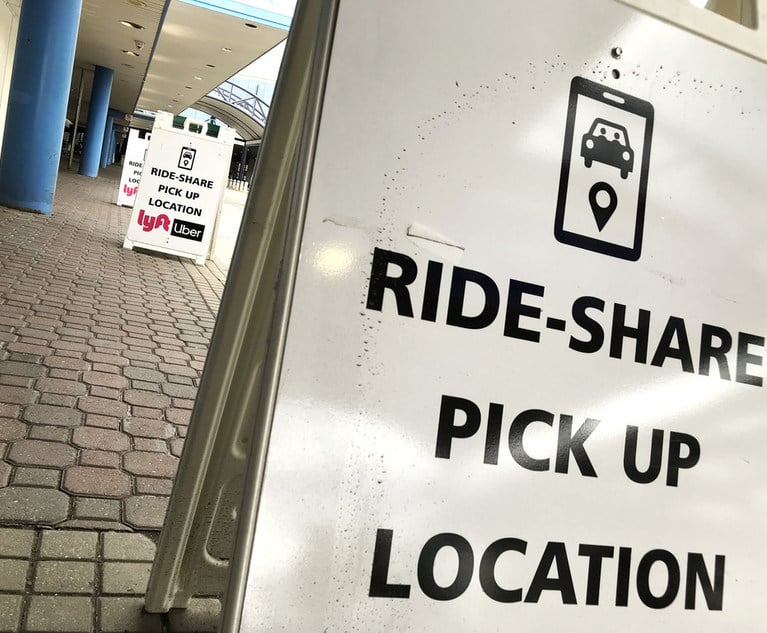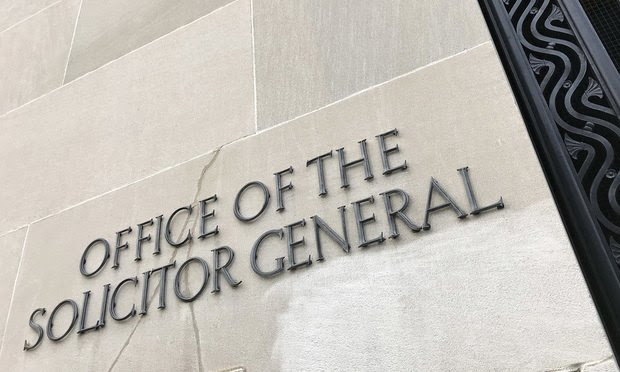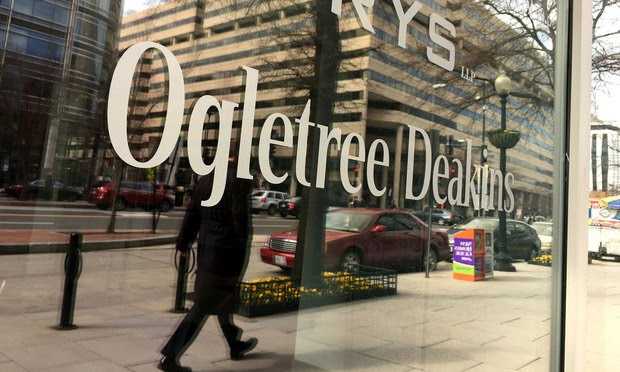Labor of Law: Catch Up on #MeToo | The SCOTUS L&E Docket | Plus: Who Got the Work, Notable Moves & More
We've got the latest this week on legislative updates and new analysis about #MeToo. Plus, the U.S. Supreme Court kicks off with a heavy L&E docket this term. Scroll down for Who Got the Work. Thanks for reading!
October 04, 2018 at 12:00 PM
8 minute read
Welcome to Labor of Law. We've got the latest legislative updates, analysis and stats on #MeToo, and the U.S. Supreme Court is back—the justices kicked off the term with a couple of labor-and-employment cases we're tracking. Scroll down for our Moves roundup, and Who Got the Work.
➤➤ I'm Erin Mulvaney in Washington, D.C., covering labor and employment from the Swamp to Silicon Valley. Follow this weekly newsletter for the latest analysis and happenings. If you have a story idea, feedback or just want to say hi, I'm at [email protected] and on Twitter @erinmulvaney.
#MeToo Investigations, New Laws & Latest Stats
The #MeToo movement, sparked by the public ousting of prominent men in power, put a broad spotlight on sexual harassment in the workplace. L&E practices are busy fielding calls, conducting investigations and providing guidance. States are implementing new laws. Here's a roundup of some of the latest developments and new analysis.
➤➤ California Gov. Jerry Brown signed a host of #MeToo-inspired bills that require corporate boards to add more women and that limit nondisclosure and non-disparagement agreements in sexual harassment and sexual discrimination settlements. One bill that would have prohibited mandatory arbitration as a condition of employment was vetoed. Brown said it “clearly violated the law.” My colleague Cheryl Miller in California has a rundown on The Recorder.
Lawmakers felt pressure to support bills that protected workers from sexual harassment, although Brown said some measures went beyond to other forms of discrimination and the labor code, says Ben Ebbink, of counsel at Fisher Phillips in Sacramento. He says the law that requires a female board of director may raise legal questions.
“California does lead on these issues. States look to California. You could see them replicate,” Ebbink says. “In general, California is the tail that wags the dog. People in other states do need to look because it's a bellwether of the trends that will sweep across the country.”
➤➤ C Suites are facing new, complex questions. A Gibson, Dunn & Crutchersurvey looked at how companies and organizations have handled internal investigations of workplace harassment. There's no consistency as to how much information a company or group will release regarding the outcome of any internal review. Still, there are some trends.
Gibson Dunn litigation partner Jason Schwartz said that although there's an instinct to keep an investigation's findings internal, there can be compelling reasons to release the information. An organization's decision about how much information to disclose following an investigation is complex and unique.
“It's a nuanced judgment and there are lots of factors that you have to balance. The second overall takeaway, is there is enormous sentiment in favor of transparency now,” Schwartz said. “If you had asked any management side employment lawyer five years ago what to do, the textbook answer is if somebody asks you (about an incident) the HR person is supposed to say, 'That is a personnel matter and we don't comment on that.' Now, I think there is a huge shift in thinking about that, largely driven by employee expectations for transparency.”
“While you might not share every detail—and there are lots of reasons you wouldn't—there is a trend toward disclosing at least something to have employees fairly appropriately and the leadership is committed to a safe workplace,” Schwartz said.
Perkins Coie partner Ann Marie Painter said more companies are turning to white-collar teams for their backgrounds in criminal prosecution and enforcement.
“There's a realization on the part of the organization's leadership today that creating and maintaining a workplace safe from gender discrimination and sexual harassment is a business issue,” Painter said. “Companies are seeing that it's an issue for investors. Issues that can impact the brand reputation and can impact stock price or value. It can have a whole lot of implications for the company's health.”
➤➤ The U.S. Equal Employment Opportunity Commission says it saw an uptick in sex discrimination and sex harassment filings, eclipsing previous years, according to a Seyfarth Shaw analysis. Seyfarth's Christopher DeGroff said the increase in sex-based filings is striking. The EEOC's fiscal year ended Sept. 30, and the filings jumped across the board.
“The dramatic increase in filings should be an eye-opener for employers in an era when many thought the EEOC might be hitting the brakes. Instead, the EEOC is increasing its enforcement activity, with a particular focus on sex discrimination and sexual harassment,” DeGroff and fellow Seyfarth attorneys write. There were 84 lawsuits filed in September alone.
Labor Docket at SCOTUS
The U.S. Supreme Court only has eight justices (for now), but the show goes on—and the first week of the term featured a couple of labor-and-employment cases that we'll continue to track. The court tinkered with its docket recently—delaying a decision on some other petitions, including the scope of LGBT protections in the workplace, my colleague Tony Mauro reports.
This week the court heard oral arguments in two labor cases, one dealing with age discrimination and another confronting arbitration agreements that involve independent contractors.
>> The arguments in Mount Lemmon Fire District v Guido examined the wording of Title VII of the Civil Rights Act and the Age Discrimination in Employment Act. The justices were asked to resolve whether a small government agency should be exempt from age discrimination laws. The U.S. government, arguing as an amicus on behalf of the EEOC, supported two firefighters who said they were terminated based on age. Jonathan Bond, an assistant to the U.S. solicitor general, said a ruling for the Arizona-based fire district would create a loophole in age discrimination enforcement.
>> The court also heard arguments in a closely watched case concerning the scope of the Federal Arbitration Act as it applies to the independent contractor agreements signed by truckers working for New Prime Inc. My colleague Marcia Coyle has more on the arguments here. Gibson, Dunn & Crutcher's Theodore Boutrous argued for New Prime, against Jennifer Bennett of Public Justice. The U.S. Chamber of Commerce, as an amicus, supported New Prime. Sen. Sheldon Whitehouse, the Rhode Island Democrat, in his first friend-of-the-court brief as counsel of record pressed for the right of independent contractors to litigate labor disputes in court.
Notable Moves
>> Littler Mendelson hired Bradford Hammock from Jackson Lewis, where he was a managing principal. Hammock joined the firm as a shareholder in the Tysons Corner and Washington offices.
>> Ogletree, Deakins, Nash, Smoak & Stewart hired an all-female, five-lawyer team from FordHarrison in Los Angeles. The team will be led by new equity partner Lyne Richardson. Read more here.
>> Troutman Sanders has brought on San Diego-based partner Mark Payne, a former chair of the labor and employment practice at Rutan & Tucker.
>> Ted Meyer joined Blank Rome as a partner in the firm's Labor & Employment Practice group. Meyer is based in Houston. Meyer joins the firm from Ogletree Deakins.
>> Seyfarth Shaw welcomes partner Daniel E. Larkin to the Corporate department in Chicago. Larkin joins from Bryan Cave Leighton Paisner, where he was a partner in its Chicago and London. Read the firm's announcement here.
Who Got the Work
>> The Times Up Legal Defense Fund, which helps fund sexual harassment in the workplace, hired Lisa Borders as its first CEO and president. Border, a former executive at Coca-Cola, earlier spent three years as president of the WNBA and former vice mayor of Atlanta. Read more at Quartz.
>> Caroline Ruiz says she was fired from cosmetics giant Avon after disclosing her pregnancy to her boss. She filed suit in the U.S. District Court for the Southern District of New York. Jeanne Christensen and Hilary Orzick of Wigdor LLPrepresent the plaintiff. Avon is represented by Felice Ekelman and Sarah Hook of Jackson Lewis P.C.
>> A former GitHub Lawyer says she was fired after asking about equal pay. Agnes Pak sued her former employer in San Francisco Superior Court, asking for a $20 million settlement as the company is in talks to be acquired by Microsoft Corporation, according to Business Insider. Adron Beene, an attorney in San Jose, represents Pak.
Around The Water Cooler
>> In a gender discrimination suit, Ogletree and an ex-partner clash over the firm's arbitration agreement. [The Recorder]
>> The National Labor Relations Board joint employer standard created under Browning-Ferris Industries has only been used in 14 cases since 2015, just a fraction of the 1,100 cases heard during that time. [Bloomberg Law]
>> Tesla resisted unionization for decades. It now faces a high-profile trial. What's it all mean for the rest of Silicon Valley? [The Verge]
>> The Labor Department's effort to quantify the gig economy fell short of capturing a reliable number. Exhibit 1: The questions asked revealed an improbably number of bank executives, surgeons and other professionals. [WSJ]
>> Plaintiffs are filing employment lawsuits against consulates and embassies. In 2017 and 2018 alone, there have been at least eight cases alleging discrimination claims, including national origin and religious. [The Washington Diplomat]
>> Amazon's massive wage hike could influence other retailers to follow suit. [Forbes]
Thanks for reading! Shoot me a note with story ideas, tips or feedback to [email protected]
This content has been archived. It is available through our partners, LexisNexis® and Bloomberg Law.
To view this content, please continue to their sites.
Not a Lexis Subscriber?
Subscribe Now
Not a Bloomberg Law Subscriber?
Subscribe Now
NOT FOR REPRINT
© 2025 ALM Global, LLC, All Rights Reserved. Request academic re-use from www.copyright.com. All other uses, submit a request to [email protected]. For more information visit Asset & Logo Licensing.
You Might Like
View All
Labor of Law: As Workers Suffer With Long Covid, Employers May Rethink Accommodations for Other Disabilities

Labor of Law: Federal Noncompete Ban Would Be Far From Last Word on Issue

Labor of Law: New Federal Rule Could Upend State Efforts to Count Ride-Share Drivers as Contractors

Labor of Law: Employer Statements on Abortion Could Spur Discrimination, Hostile Work Environment Claims
Trending Stories
- 1Judge Sides with Retail Display Company in Patent Dispute Against Campbell Soup, Grocery Stores
- 2Is It Time for Large UK Law Firms to Begin Taking Private Equity Investment?
- 3Federal Judge Pauses Trump Funding Freeze as Democratic AGs Launch Defensive Measure
- 4Class Action Litigator Tapped to Lead Shook, Hardy & Bacon's Houston Office
- 5Arizona Supreme Court Presses Pause on KPMG's Bid to Deliver Legal Services
Who Got The Work
J. Brugh Lower of Gibbons has entered an appearance for industrial equipment supplier Devco Corporation in a pending trademark infringement lawsuit. The suit, accusing the defendant of selling knock-off Graco products, was filed Dec. 18 in New Jersey District Court by Rivkin Radler on behalf of Graco Inc. and Graco Minnesota. The case, assigned to U.S. District Judge Zahid N. Quraishi, is 3:24-cv-11294, Graco Inc. et al v. Devco Corporation.
Who Got The Work
Rebecca Maller-Stein and Kent A. Yalowitz of Arnold & Porter Kaye Scholer have entered their appearances for Hanaco Venture Capital and its executives, Lior Prosor and David Frankel, in a pending securities lawsuit. The action, filed on Dec. 24 in New York Southern District Court by Zell, Aron & Co. on behalf of Goldeneye Advisors, accuses the defendants of negligently and fraudulently managing the plaintiff's $1 million investment. The case, assigned to U.S. District Judge Vernon S. Broderick, is 1:24-cv-09918, Goldeneye Advisors, LLC v. Hanaco Venture Capital, Ltd. et al.
Who Got The Work
Attorneys from A&O Shearman has stepped in as defense counsel for Toronto-Dominion Bank and other defendants in a pending securities class action. The suit, filed Dec. 11 in New York Southern District Court by Bleichmar Fonti & Auld, accuses the defendants of concealing the bank's 'pervasive' deficiencies in regards to its compliance with the Bank Secrecy Act and the quality of its anti-money laundering controls. The case, assigned to U.S. District Judge Arun Subramanian, is 1:24-cv-09445, Gonzalez v. The Toronto-Dominion Bank et al.
Who Got The Work
Crown Castle International, a Pennsylvania company providing shared communications infrastructure, has turned to Luke D. Wolf of Gordon Rees Scully Mansukhani to fend off a pending breach-of-contract lawsuit. The court action, filed Nov. 25 in Michigan Eastern District Court by Hooper Hathaway PC on behalf of The Town Residences LLC, accuses Crown Castle of failing to transfer approximately $30,000 in utility payments from T-Mobile in breach of a roof-top lease and assignment agreement. The case, assigned to U.S. District Judge Susan K. Declercq, is 2:24-cv-13131, The Town Residences LLC v. T-Mobile US, Inc. et al.
Who Got The Work
Wilfred P. Coronato and Daniel M. Schwartz of McCarter & English have stepped in as defense counsel to Electrolux Home Products Inc. in a pending product liability lawsuit. The court action, filed Nov. 26 in New York Eastern District Court by Poulos Lopiccolo PC and Nagel Rice LLP on behalf of David Stern, alleges that the defendant's refrigerators’ drawers and shelving repeatedly break and fall apart within months after purchase. The case, assigned to U.S. District Judge Joan M. Azrack, is 2:24-cv-08204, Stern v. Electrolux Home Products, Inc.
Featured Firms
Law Offices of Gary Martin Hays & Associates, P.C.
(470) 294-1674
Law Offices of Mark E. Salomone
(857) 444-6468
Smith & Hassler
(713) 739-1250











